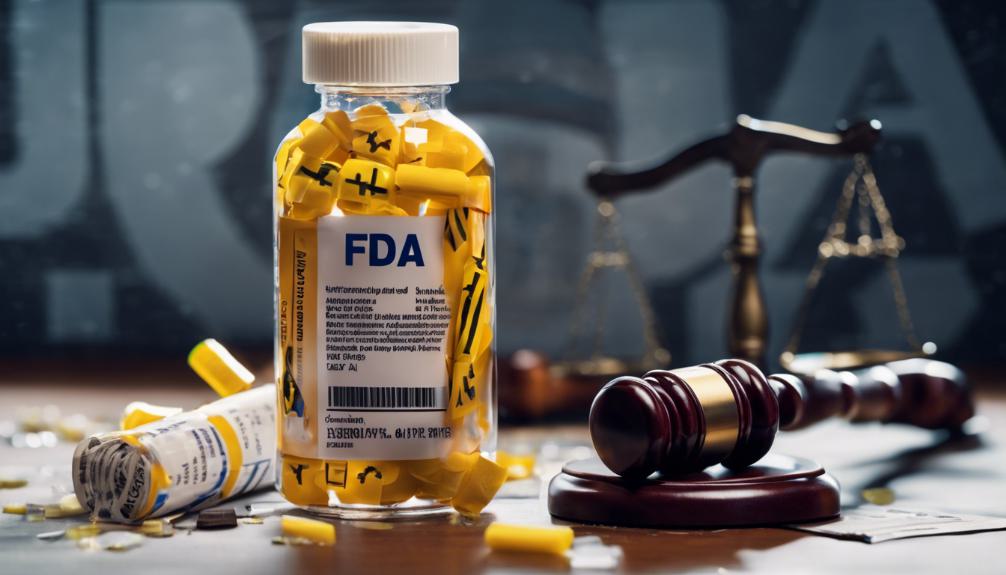PPI Crisis: Lawsuits Surge, Recalls Loom
The escalating concerns surrounding Proton Pump Inhibitors (PPIs)—a class of drugs lauded for their efficacy in treating gastroesophageal conditions—present a complex intersection of healthcare, legal, and regulatory challenges. As evidence mounts linking PPIs to serious health risks, including kidney disease and bone fractures, the surge in lawsuits against pharmaceutical manufacturers signals a growing distrust among consumers. Concurrently, the involvement of regulatory bodies, specifically the FDA, through alerts and recalls, underscores the gravity of the situation. This evolving landscape raises pertinent questions about the future of PPIs, the adequacy of current regulatory mechanisms, and the potential repercussions for millions of users worldwide, inviting a closer examination of the unfolding crisis and its broader implications.
Key Takeaways
- Lawsuits against PPI manufacturers have escalated due to inadequate warnings about potential health risks.
- Some PPI medications have been recalled over contamination concerns, increasing safety scrutiny.
- Users seeking compensation for medical expenses and pain due to PPI side effects fuel legal actions.
- The FDA has issued alerts and mandated labeling changes to enhance public awareness of PPI risks.
PPI Health Risks Overview

Numerous studies have identified a significant correlation between the use of Proton Pump Inhibitors (PPIs) and an increased risk of several serious health issues, including kidney disease, bone fractures, certain infections, dementia, and vitamin deficiencies. These findings highlight the importance of healthcare professionals and caregivers in meticulously evaluating the necessity of PPI therapy for their patients or those under their care, considering the potential long-term health implications. The Food and Drug Administration (FDA) has issued warnings regarding the dose-specific risks associated with prolonged PPI use, particularly emphasizing the heightened risk of bone fractures and certain infections. This underscores the need for vigilance and informed decision-making in the management of acid-related disorders, balancing the benefits of symptom relief against the risks of adverse health outcomes.
Kidney Disease Connection

Building on the understanding of PPI health risks, it is pertinent to examine the link between PPI use and the increased incidence of kidney disease. Research has illuminated a concerning correlation, showing users of Proton Pump Inhibitors (PPIs) face a higher risk of developing both acute kidney injury and chronic kidney disease. This connection underscores the necessity for healthcare professionals and patients alike to approach PPI use with heightened caution and awareness. By prioritizing patient education and advocating for regular monitoring of kidney function in individuals prescribed PPIs, the medical community can play an important role in mitigating these risks. As stewards of health, it is our collective responsibility to ensure that the benefits of medication do not come at the expense of important organ health.
Bone Fracture Concerns

Amid the myriad health risks associated with Proton Pump Inhibitors (PPIs), the heightened risk of bone fractures has emerged as a significant concern, particularly for long-term users. The FDA has issued warnings that prolonged use of PPIs may lead to an increased risk of fractures, especially in the hip, wrist, and spine. This risk is believed to be due to the medication's impact on calcium absorption, essential for bone health. Healthcare professionals, patients, and caregivers are therefore urged to weigh the benefits of PPI use against these potential risks carefully. For those serving others, it is important to stay informed about these developments and consider alternative treatments or mitigation strategies, such as calcium supplementation, to protect those under their care from such adverse effects.
Infections and Dementia Link

While the focus has often been on the physical risks such as bone fractures associated with Proton Pump Inhibitors (PPIs), recent research highlights an equally concerning link between PPI use and an increased susceptibility to infections and potential dementia. These findings suggest that individuals taking PPIs might be at a higher risk of developing conditions that can impact their quality of life and overall well-being. For those committed to serving and caring for others, understanding the breadth of these risks is important. It's imperative to weigh the benefits of PPIs against these potential health consequences, fostering informed decision-making in healthcare. As caregivers and healthcare providers, promoting awareness and vigilance in monitoring for signs of infections or cognitive decline in individuals using PPIs becomes a priority, ensuring the safety and health of those we serve.
Vitamin Deficiency Issues

Long-term use of Proton Pump Inhibitors (PPIs) has been linked to significant vitamin deficiencies, impacting patient health and recovery processes. These deficiencies include essential nutrients such as Vitamin B12, calcium, and magnesium. The absorption of these nutrients is important for maintaining various bodily functions, including nerve function and bone health. Patients relying on PPIs for extended periods may unknowingly compromise their nutrient intake, leading to complications such as anemia, osteoporosis, and muscle weakness. Healthcare professionals are encouraged to monitor the nutritional status of their patients on long-term PPI therapy closely. Advising on dietary modifications or supplementation can mitigate these risks, ensuring a holistic approach to patient care that prioritizes both the treatment of acid-related disorders and the preservation of overall nutritional well-being.
Lawsuits Against Manufacturers

Given the significant health risks associated with prolonged Proton Pump Inhibitor (PPI) use, numerous individuals have initiated legal actions against the manufacturers, alleging failure to adequately warn users about potential adverse effects. These lawsuits highlight concerns over kidney disease, bone fractures, infections, dementia, and vitamin deficiencies, which studies have linked to long-term PPI use. As a response to the growing number of complaints, class-action lawsuits and individual claims have emerged, seeking compensation for medical expenses, pain, and suffering. Legal professionals serving affected individuals are working diligently to navigate the complexities of pharmaceutical litigation. Their goal is to make certain that those harmed by inadequate warnings receive the justice and support they need. In doing so, they also aim to enforce higher standards of transparency and accountability within the pharmaceutical industry.
FDA Alerts and Recalls

The Food and Drug Administration (FDA) has issued multiple alerts and initiated recalls concerning Proton Pump Inhibitors (PPIs) due to safety and contamination concerns. These actions underscore the agency's commitment to safeguarding public health. PPIs, widely used to reduce stomach acid and treat various gastrointestinal disorders, have been linked to several adverse health outcomes, including increased risks of kidney disease, bone fractures, infections, and vitamin deficiencies. The FDA's proactive stance, including mandating updated warning labels and launching public awareness campaigns, aims to make certain that healthcare providers and patients are fully informed about the potential risks associated with PPI use. By closely monitoring PPI safety and responding with appropriate regulatory measures, the FDA endeavors to minimize harm and enhance patient care.
Seeking Legal Recourse

Amid growing concerns over the safety of Proton Pump Inhibitors (PPIs), individuals affected by adverse effects are increasingly seeking legal recourse to address their grievances and pursue compensation. This surge in lawsuits against PPI manufacturers is fueled by allegations that companies failed to provide adequate warnings about the health risks associated with their products. Legal experts specializing in pharmaceutical litigation are guiding affected individuals through the complexities of the legal system, offering free consultations and representing them on a guarantee basis. This guarantees that victims have access to justice without upfront costs. With the potential for significant financial settlements or court awards, those harmed by PPIs are motivated to hold manufacturers accountable, seeking reparation for medical expenses, pain, and suffering. This legal pathway provides a means for individuals to advocate for their health rights and receive the support they deserve.
Public Awareness Campaigns

In response to growing concerns surrounding the safety of Proton Pump Inhibitors (PPIs), public awareness campaigns have been initiated to educate consumers about the potential health risks and legal options available. These initiatives aim to serve the community by providing vital information on the increased risks of kidney disease, bone fractures, infections, dementia, and vitamin deficiencies associated with long-term PPI use. Moreover, they shed light on the ongoing legal battles and the rights of those affected to seek compensation. By empowering individuals with knowledge, these campaigns aspire to facilitate informed decision-making regarding their health and legal recourse. The ultimate goal is to safeguard public health and make sure justice for those adversely affected by PPIs.
Frequently Asked Questions
How Do Proton Pump Inhibitors (Ppis) Actually Work to Reduce Stomach Acid, and Why Is This Mechanism Linked to Such Diverse Health Risks?
Proton pump inhibitors (PPIs) reduce stomach acid by blocking the enzyme system responsible for acid secretion, effectively treating conditions like gastroesophageal reflux disease. However, this mechanism can disrupt natural physiological processes, leading to various health risks including kidney disease, bone fractures, infections, and more. These adverse effects stem from the alteration in stomach acidity, which can impact nutrient absorption, bacterial balance, and overall organ function, highlighting the need for careful consideration in PPI use.
What Alternative Treatments Are Available for Acid Reflux or GERD That Might Not Carry the Same Risks as Ppis?
For individuals seeking alternatives to Proton Pump Inhibitors (PPIs) for managing acid reflux or GERD, several options exist that may carry fewer risks. These include lifestyle modifications such as dietary changes, weight management, and avoiding triggers. Over-the-counter remedies like antacids or H2 blockers can also be effective. Additionally, natural supplements and practices, including herbal teas and acupuncture, have shown potential benefits. Consult healthcare professionals before shifting to these alternatives.
How Do Individual Genetic Factors or Pre-Existing Conditions Influence the Risk of Adverse Effects From PPI Use?
In the domain of healthcare, where serving others is paramount, understanding the nuanced interplay between genetic predispositions and pre-existing conditions enhances our ability to mitigate risks associated with Proton Pump Inhibitors (PPIs). These individual factors can greatly influence the likelihood of experiencing adverse effects from PPI use, underlining the importance of personalized medical consultations. Tailoring treatments to the unique genetic makeup and health history of each individual offers a pathway to safer therapeutic outcomes.
Are There Any Long-Term Studies or Research Projects Currently Underway to Better Understand the Full Spectrum of PPI Side Effects?
To address concerns about the full spectrum of Proton Pump Inhibitors (PPIs) side effects, several long-term studies and research projects are currently underway. These investigations aim to deepen our understanding of the adverse effects associated with PPI use, including potential risks of kidney disease, bone fractures, infections, dementia, and vitamin deficiencies. By examining these aspects, researchers hope to provide more thorough risk assessments and inform safer usage guidelines for patients.
How Can Patients Currently Taking PPIs Monitor Their Health for Early Signs of Potential Side Effects Mentioned, Such as Kidney Disease or Bone Fractures?
Patients utilizing Proton Pump Inhibitors (PPIs) should adopt vigilant health monitoring strategies to detect early symptoms of potential side effects. Regular consultations with healthcare providers are important for evaluating kidney function and bone density, especially given the association of PPI use with increased risks of kidney disease and bone fractures. Implementing routine health checks, including blood tests and bone density scans, can facilitate early intervention and mitigate long-term health complications.
Conclusion
To sum up, the saga of Proton Pump Inhibitors unfolds like a Greek tragedy, with the once-celebrated heroes of heartburn relief now cast as potential villains in the drama of unintended health consequences. The surge in litigation and the specter of recalls represent a modern-day pillory for manufacturers, while regulatory bodies play catch-up in a pharmaceutical version of whack-a-mole. Amidst this turmoil, the public and medical community find themselves questioning the very essence of a 'quick fix,' prompting a reevaluation of the adage that sometimes the cure can be worse than the disease.

This post has been generated by AI and was not reviewed by editors. This is Not legal advice. Please consult with an attorney.

